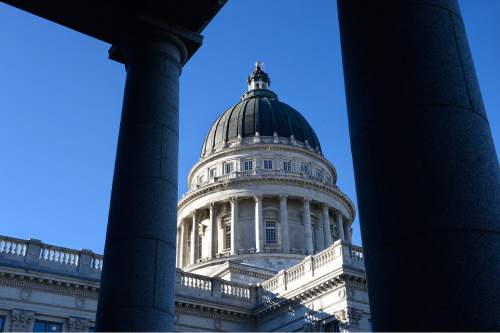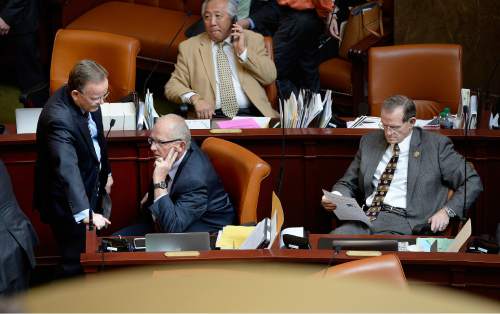This is an archived article that was published on sltrib.com in 2015, and information in the article may be outdated. It is provided only for personal research purposes and may not be reprinted.
Rep. LaVar Christensen released his vision Wednesday for legislation he says protects religious liberties in Utah while preventing employment and housing discrimination against all Utahns — although it does not specifically mention gay and lesbian residents.
The much-anticipated release of the language marks the first comprehensive religious-liberty bill to emerge since leaders of The Church of Jesus Christ of Latter-day Saints publicly called for passage of a statewide anti-discrimination law protecting lesbian, gay, bisexual and transgender Utahns, provided it be coupled with protections for people of faith.
Talks on how to merge the two conflicting policies are just getting underway and several key legislators met Tuesday with representatives from the LDS Church to discuss the church's view on the issues.
Christensen's bill would not specifically protect LGBT residents, instead drawing from a principle in Utah's hate-crimes law passed nine years ago, stating that all Utahns should be free from discrimination in employment and housing.
"It's just in the spirit of 'We the people,'" Christensen said. "We wanted to make sure all individuals have full protection under the [U.S.] Constitution and the Utah Constitution."
The Draper Republican, an attorney, was the sponsor of Utah's 2004 constitutional ban on same-sex marriage, which was struck down last December by the federal court.
To balance the anti-discrimination language, Christensen's new bill includes explicit protection for religious liberties, saying that the state must have a compelling interest — protecting public health or safety — to infringe on an individual's religious freedom and it must be done in the least restrictive way possible. It is similar to language in Religious Freedom Restoration acts passed in 17 states and at the federal level.
HB322 also gives individuals, "closely held businesses," religious institutions or their affiliates the right to refuse to provide services if it would violate their religious beliefs. And it would allow religious freedom to be used as a defense in civil or governmental claims of discrimination.
Christensen said he thinks the bill strikes the balance the church sought when it made its statement Jan. 27.
"I believe it accomplishes it," he said, "and that the church's position is constitutionally sound and it also expresses the level of compassion and general respect that we as a legislative body also feel and are diligently trying to accomplish for all the right reasons and consistent with 200 years of constitutional law."
The bill also gives judges who might hear a religious-freedom case a statutory basis — citing the Utah Constitution's protection of individual conscience and various Supreme Court rulings favoring religious liberty — to help them weigh religious beliefs against claims of discrimination.
Sen. Steve Urquhart, R-St. George, who is once again sponsoring SB100, banning discrimination against LGBT individuals in housing and employment, wondered if Christensen's bill could have far-reaching, unintended consequences.
"My question is whether HB322 would allow Shariah law to trump Utah law," Urquhart said, referring to Islamic law that, among fundamentalist Muslims, is viewed as harsh, especially toward women.
"To stop Shariah or other vile practices like bigotry that an actor claims are based on religion, it seems the state would have the burden to prove in a court by clear and convincing evidence that a conflicting provision of Utah law is 'strictly necessary to fulfill a … paramount interest of public health and safety,'" Urquhart said.
Urquhart said there are many good ideas being discussed — other than Christensen's bill — and he hopes HB322 encourages more Utahns to get involved and be politically active.
Troy Williams, executive director for Equality Utah, which advocates for LGBT rights, called Christensen's bill "radical," by intending to allow the use of religion as a defense to discrimination claims, and vowed to defeat his bill.
"By that logic not only would he be able to discriminate against gay and transgender people, but also against African-Americans, Jews, women and anyone else he thinks is a sinner," Williams said. "The big problem here is he wants to use religion to pick and choose the laws he wants to follow and our belief at Equality Utah is that religious freedom does not give us the right to fire, evict or deny services to anyone who happens to be regarded as a heretic or a sinner."
Legislative leaders are committed to balancing the religious-freedom language with the LGBT protections being sought.
"One should not proceed without the other," said Senate President Wayne Niederhauser. "If an agreement cannot be reached, then I think it's likely we could leave the session without a bill on religious liberties or nondiscrimination."
Senate Majority Whip Stuart Adams, R-Layton, who is lead negotiator in the Senate, said there is momentum behind the issue, "but with that momentum, I think we all agree we want to get it right."
Urquhart believes the anti-discrimination piece should be narrowly focused on housing and employment protections. Another bill, sponsored by Sen. Jim Dabakis, D-Salt Lake City, would extend those protections to "public accommodations," which would include most businesses.
"Serious people are now trying to find the language for a bill that will protect sacred First Amendment protections and make our state a national role model that does not tolerate discrimination in housing and employment," Dabakis, Utah's only openly gay lawmaker, said. "I remain optimistic that we will find a way."
Twitter: @RobertGehrke





